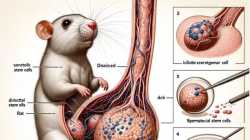[12 / 1 / 8]

70KiB, 800x450, 04uWBboRx33dyU9L1lRTlgh-1.fit_lim.size_850x490.v1708101121.jpg
Oh nuts.
https://www.pcmag.com/news/academic-journal-retracts-study-after-ai-generated-rat-penis-pics-go-viral
https://www.frontiersin.org/articles/10.3389/fcell.2023.1339390/full
Academic Journal Retracts Study After AI-Generated Rat Penis Pics Go Viral
In what has been a good week for rats, but a terrible one for science, the academic journal Frontiers retracted a viral paper published with nonsensical, AI-generated images.
The paper, titled "Cellular functions of spermatogonial stem cells in relation to JAK/STAT signaling pathway," was published on Feb. 13, 2024, and promptly made the rounds on social media for its outlandish images of a rat's penis.
The authors of the study—Xinyu Guo, Liang Dong, and Dingjun Hao—reportedly used Midjourney to create the images. It's unclear what prompt the authors put into Midjourney. Perhaps "cross section of rat penis"? At any rate, it resulted in an oversized phallus they apparently did not find objectionable.
AI image generators are notorious for misspellings, including Midjourney, resulting in diagram labels such as "dck" (dick) and "testtomcels" (testicles), though it did correctly identify "rat." The authors, who are Chinese, submitted the paper for review, which was then edited by someone in India, and reviewed by two more people, one in the US and one in India.
As images circulated online, scientists pointed out vast inaccuracies across all of them and questioned the peer review process.
The US-based reviewer, Jingbo Dai of Northwestern University, apparently noticed the inaccurate images in the study but failed to ensure it was not published. He told Vice it was his responsibility to review the paper for its "scientific aspects" and recommended asking Frontiers about its "policy of AI-generated figures."
Two days after publication, Frontiers pulled the study from the site and conducted an investigation. It then officially retracted it on Feb. 16, 2024, and issued an apology.
https://www.pcmag.com/news/academic-journal-retracts-study-after-ai-generated-rat-penis-pics-go-viral
https://www.frontiersin.org/articles/10.3389/fcell.2023.1339390/full
Academic Journal Retracts Study After AI-Generated Rat Penis Pics Go Viral
In what has been a good week for rats, but a terrible one for science, the academic journal Frontiers retracted a viral paper published with nonsensical, AI-generated images.
The paper, titled "Cellular functions of spermatogonial stem cells in relation to JAK/STAT signaling pathway," was published on Feb. 13, 2024, and promptly made the rounds on social media for its outlandish images of a rat's penis.
The authors of the study—Xinyu Guo, Liang Dong, and Dingjun Hao—reportedly used Midjourney to create the images. It's unclear what prompt the authors put into Midjourney. Perhaps "cross section of rat penis"? At any rate, it resulted in an oversized phallus they apparently did not find objectionable.
AI image generators are notorious for misspellings, including Midjourney, resulting in diagram labels such as "dck" (dick) and "testtomcels" (testicles), though it did correctly identify "rat." The authors, who are Chinese, submitted the paper for review, which was then edited by someone in India, and reviewed by two more people, one in the US and one in India.
As images circulated online, scientists pointed out vast inaccuracies across all of them and questioned the peer review process.
The US-based reviewer, Jingbo Dai of Northwestern University, apparently noticed the inaccurate images in the study but failed to ensure it was not published. He told Vice it was his responsibility to review the paper for its "scientific aspects" and recommended asking Frontiers about its "policy of AI-generated figures."
Two days after publication, Frontiers pulled the study from the site and conducted an investigation. It then officially retracted it on Feb. 16, 2024, and issued an apology.
